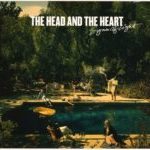The Head and the Heart, Signs of Light

Things have changed a fair bit for Seattle band The Head and the Heart, these past few years. Most famously, frontman Josiah Johnson has been struggling with addiction, which means that while he wrote/co-wrote the songs on Signs of Light — particularly the title track, which closes out the album — he’s been on hiatus from the band since last March. That’s a pretty big thing, considering that Johnson is the face and voice of THATH for a lot of fans out there.
That’s hardly the only change the band’s undergone, however, as ably demonstrated by this album, their first for Warner Bros. rather than hometown label Sub Pop. While the group’s folky roots aren’t gone by any means, they’re damn near swallowed up here by a tidal wave of gloriously lush, multi-layered pop…and yeah, that’s a very, very good thing. Sadly, the indie-folk scene feels very played out in 2016, to the point where anything remotely similar makes me cock a sidewise eyebrow; a band that wants to survive needs to evolve from that, to move on to something bigger, something more all-encompassing.
And they’ve definitely done that here. Going into Signs of Light, I certainly wouldn’t have expected it, but the comparison that hits me the most is to a more-pastoral (or at least less-urban) Broken Social Scene. Take “City of Angels,” for one — it’s somehow California-sounding, with understated harmony vocals, a hip-shaking rhythm, and a sunshiny, undeniably poppy vibe. The song is joyful, warm, and sweet, with a guitar tone you want to reach out and hug and a bass that sounds like walking down a sunlit street at the tail end of spring, with blue skies above and the summer heat not yet crushing everything to the pavement.
Or there’s “Dreamer,” which showcases a Beatles/psych-rock influence and a throwback Motown rhythm at the same time, along with awesome duet vocals, or “Turn It Around,” where Chris Zasche’s bassline gets my vote for star player, limber and fast-moving, almost retro-sounding without being kitschy, and understated but absolutely there. The latter feels occasionally like the band’s throwing in the kitchen sink, to be sure, what with the little funky percussion bits, multi-layered acoustic guitars, and oddball little chunks of noise, but they make it all hang together like an intricate mobile.
That’s part of the BSS resemblance, too — both bands have a talent for building a song like you’d build an actual structure, layering piece upon piece until the whole is something completely different from its component parts. Even Charity Rose Thielen’s strings are a piece of it; in the hands of a lesser band, they’d be an unwelcome distraction on tracks like the warm, hazy, defiant “Take A Walk,” but here they fit like just another piece of the puzzle the band’s confidently putting together.
Like I said, The Head and the Heart’s folk past isn’t gone; it’s just melded into the whole more than it previously was. Like on “Library Magic,” which is folky and delicate, a rootsy take on Simon and Garfunkel and seemingly a rumination on the rough life of a band on the road and the temptation to just throw in the towel and stay home, or the delicate, comforting “Your Mother’s Eyes,” which is less a pop song, folk or otherwise, and more an earnest lullaby.
A highlight for me is the jangly, appropriately danceable “Rhythm & Blues,” which has a roots-pop feel to it that makes me think of wholly underappreciate band The Little Heroes, albeit with a rougher-edged voice that’s reminiscent of David Ramirez’s less self-hating/self-doubting moments.
Overall, it feels to me like the band has taken all the best parts of what they used to do and crafted something new with them, adding elements as necessary. And it works like crazy, especially on lead single “All We Ever Knew,” with its insistent beat and sweetly yearning sound, or the somber and pleading “Oh My Dear,” which uses a voice and a lone, semi-distorted, Billy Bragg-like guitar to great effect.
I can’t forget the closing title track of the album, either. Apparently written by Johnson before he headed into rehab, “Signs of Light” is soft but intense, with pleading, forlorn vocals and fragile piano. It begins like Johnson’s a man on the verge of a collapse, speaking to a friend or loved one in their hospital bed and unsure if he’ll get the chance again, but it slowly builds into this arena-sized, Coldplay-at-their-best rock song that’s beautiful and massive at once. It’s an iconic song, marrying beauty and stark, wide-open pain in a way few songs truly do.
Sub Pop-era fans of The Head and the Heart may not be ready for this, it’s true; it may not be what they’re expecting or looking for. But trust me when I say that it’s definitely what the band — and its fans — need.



Leave a Reply